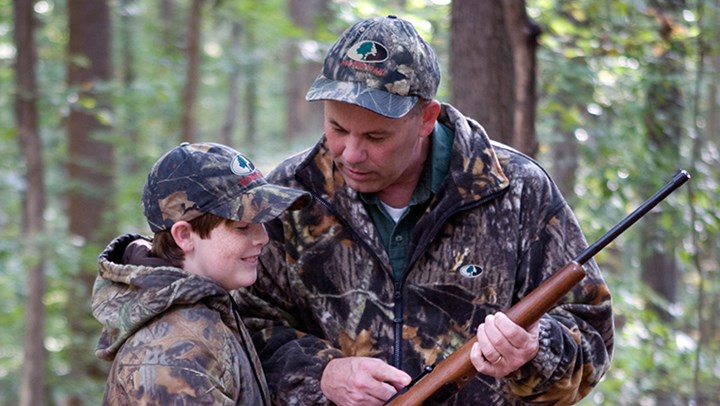
by Jenifer Wisniewski, Chief, Outreach and Communication, Tennessee Wildlife Resources Agency - Monday, August 30, 2021

Let’s get real about hunter education and the national R3 movement to “recruit, retain and reactivate” hunters. Hunter education is mandatory in some form in all 50 states and that curriculum is managed by the International Hunter Education Association (IHEA). Our community of hunters, state fish and wildlife agencies, non-governmental organizations (NGOs) and others have insisted that people have hunter education prior to hunting, which is a good thing. But the required class can be a barrier to R3 in some places and we can help to change that.
A misconception of hunter education is that mainly kids take it. Out of the more than 600,000 people who took a course last year, over half of them were over age 18. These are mainly adults learning to hunt for the first time during the pandemic, as reported by websites such as NRAHLF.org, and they need more than just beginner hunter education to go and have a successful hunt.
Why Online Hunter Education Should Be an Option in Every State
Attendance in hunter education courses grew exponentially during the pandemic as more states transitioned their offerings online or to an in-person/online hybrid. During the National R3 Summit this past May, Alex Baer, executive director of the International Hunter Education Association, shared that, in a survey of 40 states, there was a 15 percent increase in hunter education students over the prior year. Of note, 86 percent of states that added a new form of hunter education delivery, such as a new online class, saw an increase. New York is a great example of this. Previously, New York had offered exclusively in-person classes, then, as COVID-19 hit, it offered an online-option and drew more than 50,000 people. There was an overall increase in the 18 to 30 and 50-plus age groups, as well as with women. Most new hunter education students, in fact, were women.
This tells me that when states require an in-person component to hunter education, we are building a huge barrier for R3. If the statistics above are not enough reason to support offering completely online hunter education, here are some other things to consider.
States that don’t offer hunter education online are creating a barrier for their residents. Every state allows for someone who has completed hunter ed online to hunt there through reciprocity agreements. This means that a hunter who passed online education in one state can go hunt in other states that do not offer online education.
Why We Still Need Hunter Education Instructors and Volunteers
The fact is that much of what we have been calling hunter education is really hunter safety. There is a lot that we don’t cover that a hunter needs to know to start hunting, from woodsmanship and orienteering skills to meat processing. There is a huge demand for opportunities to learn these types of skills in-person through hands-on classes. New participants who do not feel comfortable hunting on their own after completing an online course may be interested in additional education opportunities from a local instructor. We need hunter education volunteers to adjust course and adopt new classes to teach and support new hunters.
According to the IHEA, only two out of three people who take a hunter education course go on to buy a license. So how do we fix that? Using our network of hunter ed volunteers to offer courses tailored to different skill levels to satisfy the demand for classes we aren’t teaching. Our dedicated experts can continue to work with state wildlife agencies and offer such classes that will have a higher impact on the next generation that hunts as well as helping to make sure we create more successful hunters. Classes on everything surrounding hunting, such as on firearms, archery, wildlife tracking, advanced hunting skills and so much more would be a great alignment of the skills demonstrated by our passionate instructors.
How the IHEA Is Helping
The IHEA currently is researching how to make hunter education even better. It is conducting surveys to learn how potential hunters want to receive their education and what they’re looking for in the courses. It is considering additional curricula and even refresher courses as the NRA has done. The specialized courses would, of course, still focus on safety as the No. 1 priority. If you want to learn more about its research or get involved, click here.
Here is a snapshot into some of the research the IHEA has done that will be released soon. The research shows the segments of people who are taking hunter ed now as follows:
How the NRA Is Offering the Best Form of Hunter Education
There are several ways to take online hunter education through different course offerings. Many of them charge a fee, which creates another barrier to hunting. The NRA provides an IHEA-approved online course for free. Offered by the organization that built America’s first-ever hunter education program in 1949, this state-of-the-art course is the most comprehensive online hunter education instruction in the United States—and did I mention it is 100 percent free? For more information, click here. If you don’t see your state as an option for the free NRA online course, reach out to your state fish and wildlife agency and tell the agency representative that you would like to take advantage of the NRA option.
Through research and experience, we have made great strides in recruiting the next generation of safe hunters. We must continue to evolve. Updating our hunter education options is one sure way to do it.
About the 2020-2021 Voice of Leadership Panel
The Voice of Leadership Panel is an appointed group of outdoor industry leaders who have volunteered to contribute their voices on key hunting and outdoor recreation issues to inform, inspire and educate participants within our community. Panelists for this year include:
Facilitators:
E-mail your comments/questions about this site to:
[email protected]
